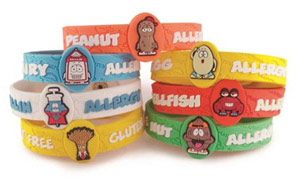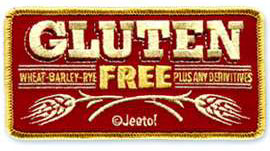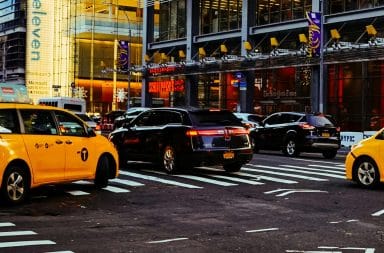Welcome to the world of genetic inferiority. You have been blessed with a body that throws fits and spasms because you ate something that is normal to eat. Whether it's an allergy to wheat, peanuts, eggs, dairy, shellfish, you must bear a cross. That is unless that cross contains any traces of the aforementioned untouchables. Living isn't designed to be easy, but it is designed extra haphazardly (almost as if evolution had fallen asleep on the job) for people with allergies. Here are the seven worst aspects of such an unfortunate disposition.
7. Your kryptonite is incredibly mundane.
Wheat is the number one source of carb intake for most people. There has to be an alternate source. Even if it means mowing the lawn.It sucks knowing that if the apocalypse were to happen tomorrow you'd be one of the first to go, granted there were no scientists left to engineer artificially tolerable foods. How lame is that? Nevermind post-apocalyptic hypotheticals, imagine being that kid who gets rushed to the hospital near death because he got a little too friendly with a peanut. Allergy people are not built to live in a Darwinian world; if it weren't for the state of our technologically-advanced civilization today, we surely would have died out with the Dodo birds.
6. Food that is edible costs extra.
There is a good racket in the fake food business. Everything costs about double and comes with half the amount of food. This is especially true of the things we need most. Like the healthcare industry thrives on treating (and never curing) and charging exorbitant prices on basic life needs, the food substitute industries absolutely rake it in knowing they have a guaranteed market, and one that is too much of a niche for any kind of anti-corruption effort on the part of an intervening government. After all, the government's way too busy rolling it in with petty fees, fines, and other bent means of revenue accrual.
5. Eating out makes you look like a neurotic, high maintenance weirdo.
 Eating together in many cultures is very much a ritualistic social function. More than for the food itself, it's about being together and being contented on multiple survival needs simultaneously. But when you have to pull the server aside and explain how tough you got it and nitpick each little menu entry, you will soon become the buzzkill in the group, making dining a needless hassle. Until restaurants are uniformly equipped to understand the needs of allergic patrons and accommodate them implicitly, asking, "How would you like that prepared?" will always carry a double-meaning, requiring a two-part answer for some: "Well done, and with an obsessive guarantee of non-contamination."
Eating together in many cultures is very much a ritualistic social function. More than for the food itself, it's about being together and being contented on multiple survival needs simultaneously. But when you have to pull the server aside and explain how tough you got it and nitpick each little menu entry, you will soon become the buzzkill in the group, making dining a needless hassle. Until restaurants are uniformly equipped to understand the needs of allergic patrons and accommodate them implicitly, asking, "How would you like that prepared?" will always carry a double-meaning, requiring a two-part answer for some: "Well done, and with an obsessive guarantee of non-contamination."
4. You can't live on a whim.
You can't just get in the car and ride when you have a food allergy (you can have a decent sized panic attack though). When fast food or convenience stores along the way provide frequently unsound options, you must pack a separate suitcase full of food that you might need, accounting for three daily meals. It makes things incredibly dull and predictable, but as long as you learn to appreciate things other than food, you can pack a backpack full of peanut-free peanut butter and bread-free bread (or a Trader Joe's grab bag of allergy-friendly staples) and make it through the day.
3. Food substitutes just don't stack up.
It's getting better (sounds like another campaign…), but it's still far from perfect. Wheat will never find a proper edible doppelganger, but there's no shortage of hellbent gluten-free kitchens/laboratories that will try to with anything they can find: corn, rice, whatever the fuck wheatgrass is (if it's anything like it sounds, it's turned lawn-mowing into a kamikaze mission). Crackers are usually stale tasting, and everything else is just engorged with salt, perhaps to numb our tongues into flavor apathy. While taste and likeness is one thing, there is also the risk of malnutrition. Wheat is the number one source of carb intake for most people. There has to be an alternate source. Even if it means mowing the lawn.
2. Nobody really gives a fuck.
 Yeah, restaurants are slowly implementing various forms of allergy awareness, usually those now ubiquitous "Tell Your Server If Someone in Your Party Has a Food Allergy" signs which basically equate to asking "How Inconvenient Are You Going to Make Our Job Today?" Some restaurants (e.g. Dominos, California Pizza Kitchen, etc.) actually serve gluten-free items, such as pizza, but do so with a disclaimer that they "cannot guarantee that cross-contamination won't be a risk"; after all, they don't go so far as to purchase a GF-specific over or designate private counter space for their dough. But hey, they tried. The bottom line is, they don't really give a fuck, but they want to get in on the buzz (that might actually just be an allergic reaction), because jumping on board the gluten-free train, a hot craze in this increasingly tolerant world, is incredibly good for business. But also incredibly misguided (and destructive) without proper education.
Yeah, restaurants are slowly implementing various forms of allergy awareness, usually those now ubiquitous "Tell Your Server If Someone in Your Party Has a Food Allergy" signs which basically equate to asking "How Inconvenient Are You Going to Make Our Job Today?" Some restaurants (e.g. Dominos, California Pizza Kitchen, etc.) actually serve gluten-free items, such as pizza, but do so with a disclaimer that they "cannot guarantee that cross-contamination won't be a risk"; after all, they don't go so far as to purchase a GF-specific over or designate private counter space for their dough. But hey, they tried. The bottom line is, they don't really give a fuck, but they want to get in on the buzz (that might actually just be an allergic reaction), because jumping on board the gluten-free train, a hot craze in this increasingly tolerant world, is incredibly good for business. But also incredibly misguided (and destructive) without proper education.
1. A lot of people have it but don't know it.
How fortunate to be someone who immediately breaks out with hives or convulsions upon contact. If only we could all be so lucky. The truth is, millions of people have some kind of food allergy, such as a gluten intolerance, and many might not even know it because the symptoms are so slight. So down the road, bigger health concerns can show up—cancers, intestinal failure, and the like—all because you enjoy Olive Garden so much. So basically, Olive Garden could end up giving you cancer. And when you're here, it's terminal.


